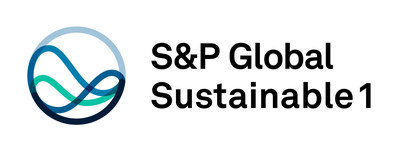Press Releases
- New dataset includes exposure scores, describing the exposure of an asset or company to climate change hazards, and new financial impact metrics
- Research using the new dataset shows that 92% of the world's largest companies will have at least one asset at high exposure to a climate change physical hazard by the 2050s
- Over a third of the world's largest companies have at least one asset where the physical risks of climate change are equivalent to 20% or more of that asset's value by the 2050s, according to new S&P Global Sustainable1 research
NEW YORK, Sept. 15, 2022 /PRNewswire/ -- S&P Global Sustainable1 has today launched an enhanced Physical Risk Exposure Scores and Financial Impact dataset to support companies, investors, governments and other stakeholders as they seek to understand and manage the physical and financial exposure of corporates and portfolios to climate change.
The dataset includes exposure scores, describing the exposure of an asset or company to climate change hazards, and financial impact metrics reflecting the projected future financial costs of changing hazard exposure, expressed as a percentage of the value of the exposed assets.
Bringing together the data capabilities of S&P Global Trucost and The Climate Service, an S&P Global Company, acquired in January 2022, the Physical Risk Exposure Scores and Financial Impact dataset provides information on the exposure of over 20,000 companies and over 870,000 asset locations to a range of climate change related hazards across a range of four CMIP6 Shared Socioeconomic Pathway (SSP) climate change scenarios.
"More than ever, investors and companies are seeking advanced analytics to respond to the financial impact of climate change. Essential to this, is the ability to quantify the financial impact of climate change at asset level to enable meaningful mitigation and adaptation planning. This new dataset is a huge step forward as it enables market participants to access financial impact metrics, reflecting the projected future financial costs of changing hazard exposure for 20,000 companies, down to the rooftop level. In simple terms, this dataset allows companies and investors to understand their climate risks – and, vitally, what they could cost."
The enhanced dataset now covers exposure to eight hazards (extreme heat, extreme cold, wildfire, water stress, drought, coastal flood, fluvial flood and tropical cyclone), utilizing the latest available CMIP6 models and proprietary methods. It also now includes an extension of scenario projections to include five additional time periods - decadal averages from the 2020s to the 2090s for all scenarios and hazards.
"In 2022, many countries have experienced unprecedented weather conditions, including heat waves in the UK; wildfires in the US and record temperatures in China. Against this backdrop, this new dataset uses the best available climate models and integrates a new climate change hazard, drought, to ensure market participants have access to high quality data and evidence-based insights as they seek to understand and adapt to their exposure to the physical risks of climate change. We remain committed to enhancing our data capabilities and increasing the breadth of our coverage to offer best-in-class support for clients."
Applying this new dataset to the S&P Global 1200, it shows that:
- 92% of the world's largest companies have at least one asset at high exposure (score >75 out of 100) to a climate change physical hazard by the 2050s, rising to 98% by the 2090s under a BAU scenario
- Over a third (34%) of the world's largest companies have at least one asset where the physical risks of climate change are equivalent to 20% or more than that asset's value by the 2050s, rising to 48% by the 2090s under a BAU scenario
- More than 70% of S&P Global 1200 companies in the Utilities, Energy and Materials sectors have at least one asset where the physical risks of climate change are equivalent to 20% or more of that asset's value under the BAU scenario
- The share of large companies with assets at high physical risk could be reduced to 39% by the 2090s (20% reduction) under an emissions scenario consistent with limiting global temperature rises to less than 2 degrees Celsius
S&P Global Sustainable1 is the central source for sustainability intelligence from S&P Global. Sustainable1 matches customers with the ESG products, insights and solutions from across S&P Global's divisions to help meet their unique needs. Our comprehensive coverage across global markets combined with in-depth ESG intelligence provides financial institutions, corporations and governments an unmatched level of clarity and confidence to successfully navigate the transition to a sustainable future. Our data and well-informed point of view on critical topics like energy transition, climate resilience, positive impact and sustainable finance allow us to go deep on the details that define the big picture so customers can make decisions with conviction. To learn more, please visit: www.spglobal.com/esg
S&P Global (NYSE: SPGI) is the world's foremost provider of credit ratings, benchmarks and analytics in the global capital and commodity markets, offering ESG solutions, deep data and insights on critical economic, market and business factors. We've been providing essential intelligence that unlocks opportunity, fosters growth and accelerates progress for more than 160 years. Our divisions include S&P Global Ratings, S&P Global Market Intelligence, S&P Dow Jones Indices and S&P Global Platts. For more information, visit www.spglobal.com.
Media Contacts
Sarah Whybrow
Global Director of ESG Communications, S&P Global Sustainable1
sarah.whybrow@spglobal.com
+447929 711556
SOURCE S&P Global Sustainable1

